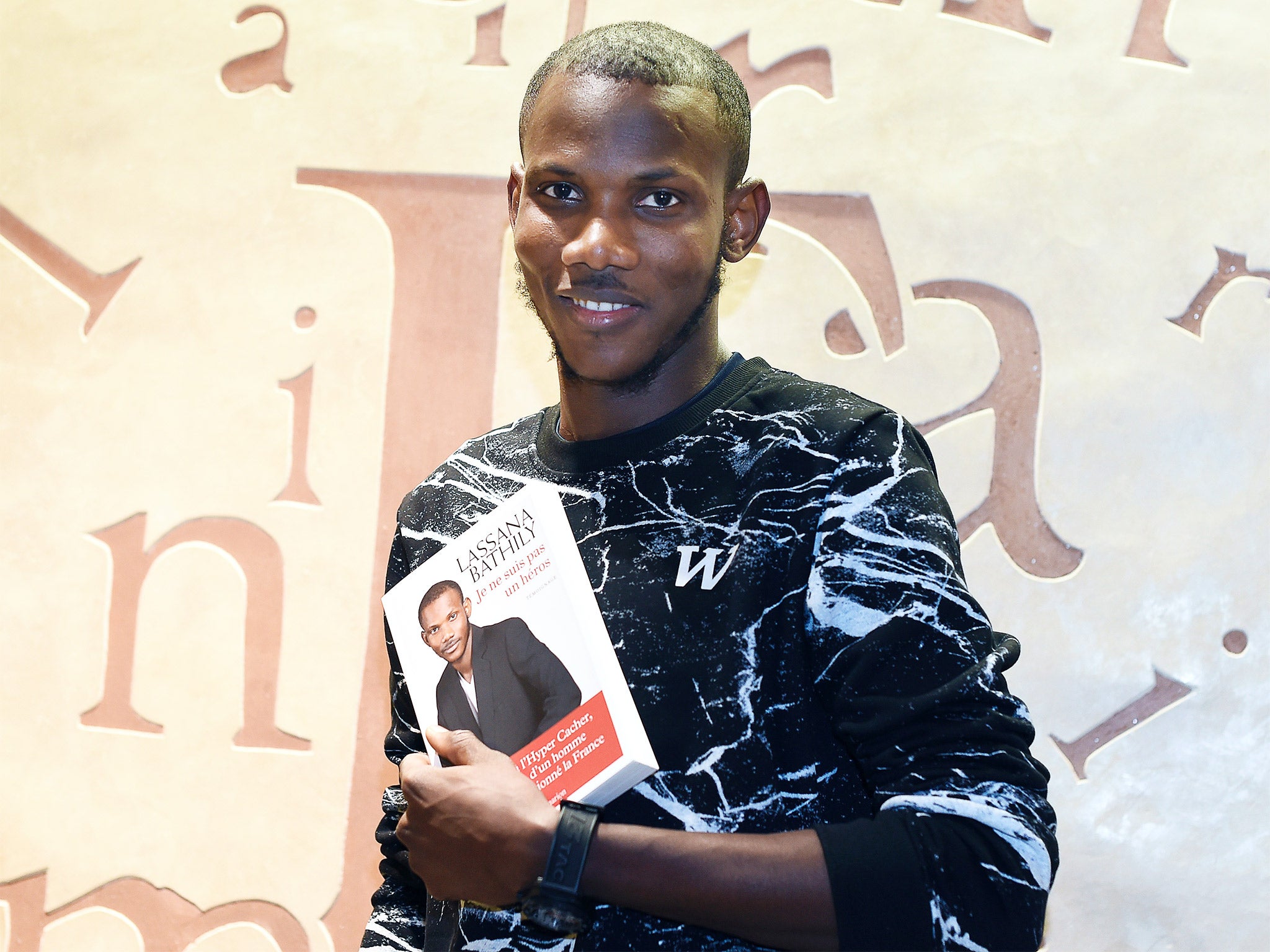Charlie Hebdo attacks: Paris hero Lassan Bathily tells of mixed emotions a year after atrocity
The young Malian went from migrant worker to right-wing target after helping hide Jewish hostages at a kosher supermarket before briefing police before their successful assault

Your support helps us to tell the story
From reproductive rights to climate change to Big Tech, The Independent is on the ground when the story is developing. Whether it's investigating the financials of Elon Musk's pro-Trump PAC or producing our latest documentary, 'The A Word', which shines a light on the American women fighting for reproductive rights, we know how important it is to parse out the facts from the messaging.
At such a critical moment in US history, we need reporters on the ground. Your donation allows us to keep sending journalists to speak to both sides of the story.
The Independent is trusted by Americans across the entire political spectrum. And unlike many other quality news outlets, we choose not to lock Americans out of our reporting and analysis with paywalls. We believe quality journalism should be available to everyone, paid for by those who can afford it.
Your support makes all the difference.Lassana Bathily was one of the few “good news stories” to emerge from the three-day terrorist rampage which began with the attack on Charlie Hebdo a year ago.
The young Malian shopworker helped to hide Jewish hostages at a kosher supermarket and then escaped to brief police before their successful assault on the lone gunman who had captured the store in eastern Paris.
But his “heroic” behaviour – never a word he used himself – has since been questioned by some witnesses and mocked by hard-right commentators in France. Mr Bathily, 25, was mysteriously omitted from a long list of terror attack “heroes and victims” who were awarded the Légion d’honneur last week.
Now, in a book published on Wednesday, “Je ne suis pas un héros” (I am not a hero), Mr Bathily is seeking to put the record straight. No, he did not do anything special on 9 January 2015, two days after the Charlie Hebdo murders.
Yes, he did help to hide a dozen shoppers in an underground cold store. Yes, he did escape in a goods lift and gave police a detailed map of the building and the locations of the gunman, Amédy Coulibaly, and the hostages.
Attempts to downplay his role “anger and sadden me”, he says in his book. They amount to “racism, pure and simple”. Much – maybe too much – was made of his story at the time, he points out, because he was a Muslim who helped to save Jews.
“Now some people say that I was just an alibi for liberal consciences. France needed a black hero and a Muslim hero. Could I not just be an ordinary person who acted like a human being, and not first and foremost a black man and a Muslim?”
Mr Lassana movingly describes the media and political whirlwind which engulfed a supermarket shelf-stacker and migrant from a desert village in Mali a year ago this week. He was pursued by the world’s press; telephoned by President François Hollande; given fast-track French citizenship; and invited to three lecture tours of the United States.
“Of course, there were wonderful moments,” he writes. “But also very difficult ones. I was not prepared for anything like that… to be applauded in Paris, Bamako, Washington, New York. I began to ask myself, ‘Do I deserve all this?’”
One organisation that declined to honour Mr Bathily was his employer – the Hyper Cacher supermarket chain. They offered him his old portering and shelf-stacking job back.
“I felt insulted,” he writes. “For them I was just a little immigrant labourer and doomed to remain so. I did not share their miserable opinion of me.”
Instead, Mr Bathily took up a post with the Paris town hall, helping to stage youth and sporting events. He is also training as a teacher. He has started a charitable association, helping young people in poor multiracial districts of France, and develops his home village, Samba Dramané, at the end of an eight-mile dirt track in Mali.
Contrary to many reports, Mr Bathily was not an illegal immigrant at the time of the attacks but had temporary French work and residence permits.
His book ends with an emotional appeal to other African migrants not to risk their lives for the mirage of prosperity in Europe. “I want to tell them that life can be poor in Africa but it can be equally miserable (for illegal migrants) in Europe,” he writes.
One great mystery remains. The new year French honours list included posthumous Légions d’honneur for all the 12 Charlie Hebdo and 4 Hyper Cacher victims, and gave France’s highest civilian honour to many people who responded to the January and November terror attacks. There was even an award for a police dog killed in a raid, but there was nothing for Mr Bathily. Neither the government nor Mr Bathily would comment.
“It’s inexplicable,” Thiaba Bruni, spokeswoman of the French council of black associations told The Independent. “We were twice promised by the Elysée Palace that Mr Bathily would be on the next honour’s list. Then nothing. No explanation. We can only assume that it is some form of racism.”
Join our commenting forum
Join thought-provoking conversations, follow other Independent readers and see their replies
Comments